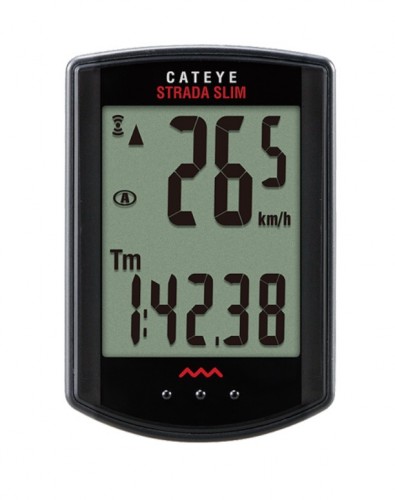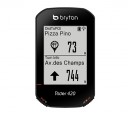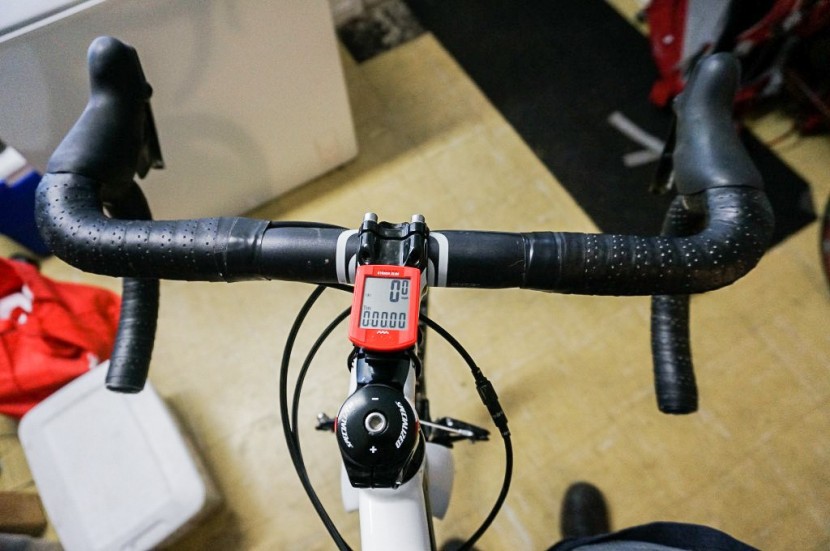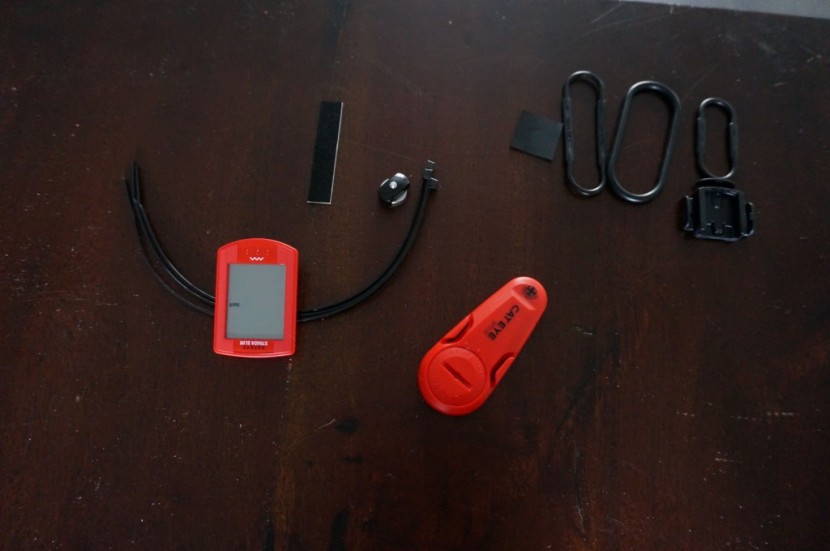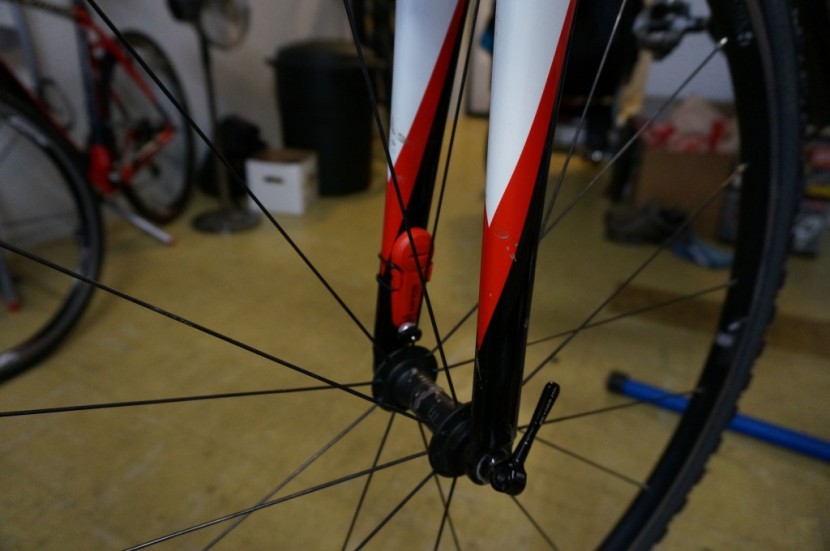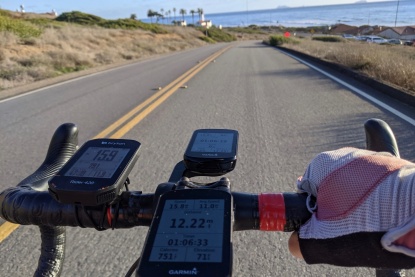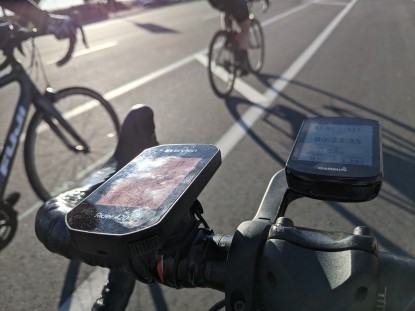Though we tested the Strada Slim in red, it is now only available in black.
Cateye Strada Slim Review
Our Verdict
Though we tested the Strada Slim in red, it is now only available in black.
Compare to Similar Products
 This Product
Cateye Strada Slim | |||||
|---|---|---|---|---|---|
| Awards | Best Bang for the Buck GPS Enabled Computer | Best Basic Computer | |||
| Price | $70 List $64.86 at Amazon | $160 List $89.95 at Amazon | $60 List Check Price at Amazon | $50 List $49.99 at Amazon | $28 List $23.96 at Amazon |
Overall Score  |
|||||
| Star Rating | |||||
| Bottom Line | A basic cycling computer for those wanting to track distance, time, and speed | You're trading user experience for price against unrefined performance | The ideal computer to get your basic riding data without fussing over the noise | Promising price, but disappointing due to bad app and buttons that make it a pain to use | Ultra basic cycling computer with wired sensors |
| Rating Categories | Cateye Strada Slim | Bryton Rider 420 | CatEye Quick | COOSPO BC107 GPS | Cateye Velo 7 |
| Ease of Use (30%) | |||||
| Ease of Setup (20%) | |||||
| Features (20%) | |||||
| Versatility (20%) | |||||
| Water Resistance (10%) | |||||
| Specifications | Cateye Strada Slim | Bryton Rider 420 | CatEye Quick | COOSPO BC107 GPS | Cateye Velo 7 |
| GPS enabled | No | GPS, Glonass, BDS, Galileo, QZSS | No | GPS, BEDOU | No |
| Cadence Sensor | No | ANT+ or Bluetooth | No | ANT+ | No |
| Heart Rate Monitor | No | ANT+ or Bluetooth | No | ANT+ | No |
| Power Meter | No | ANT+ | No | ANT+ | No |
| Smart Trainer | No | ANT+FE-C | No | No | No |
| WiFi | No | No | No | No | No |
| Weight | 12g | 67g | 18g | 64g | 29g |
| Dimensions | 1.25" x 1.8" x 0.4" | 2" x 3.3" x 0.86" | 3.7" x 2.1" x 1.4" | 3.1" x 2.1" x 0.8" | 1.5" x 2.1" x 0.75" |
| Display Size | 0.8" x 1.2" | 2.3" | 1.25" x 1.25" | 2.3" | 0.9" x 1.2" |
| Battery Type | CR2032-Sensor, CR1616-Display | Lithium polymer | CR2032-Sensor, CR1616-Display | Re-chargable lithium ion | CR2032 |
| Battery Life | 1+ years | Up to 35 hours (claimed) | 1+ years | 28 hours with GPS (claimed) | 1+ years |
| Touchscreen? | No | No | No | No | No |
| Phone App | None | Bryton Active App | None | CoospoRide | None |
| Accessory Interface ANT+, BTLE, BT. | Proprietary Analog Wireless | Bluetooth, ANT+ | Proprietary Analog Wireless | ANT+ | Wired |
| Strava Segments | No | No | No | No | No |
| Text, Email, Call notifications | No | Yes | No | No | No |
| Navigation | No | Yes | No | No | No |
Our Analysis and Test Results
The Strada Slim is a small, sleek cycling computer, with a wireless speed sensor. It stands out from other computers we tested with an incredibly low weight, at just 12g. We also like that it is designed to be attached with the included rubber straps rather than zip ties. It is not GPS enabled, and thus you are not able to download your ride data, but it is a reliable, easy-to-use training tool. When it senses movement it automatically starts recording, so you will never have to worry about turning it on, just get on and ride. Not everyone needs an advanced data analysis tool with GPS maps — for some simple is better.
Ease of Use and Interface
The Strada Slim lacks visible buttons anywhere on the front of the computer. Scrolling through the data points is accomplished by pushing on the lower portion of the computer body, activating a hidden rear button that pushes against the mounting bracket.
It is a clean look, and you can feel a definite click when you push on the computer. The computer automatically starts up when movement is detected and keeps a running total of distance like the odometer in your car. Nothing too fancy, but it is simple, and it works every time. Compared to other more complex cycling computers such as the GPS-enabled Garmin Edge 530 the Strada Slim takes less effort to master, and the various functions can be quickly figured out by trial and error.
Set-up
Initial setup is fairly easy, all you need to do is input your wheel size and set the current time. A tire size chart with corresponding circumference numbers is included with the directions to help you get an accurate size.
Small recessed buttons on the back of the unit are used to perform initial setup functions. We needed a paper clip to push the buttons, which was a bit of a hassle, but you should only need to go through the setup process once.
Attachment of the head unit is accomplished using the included rubber straps, with options to mount the bracket on either your handlebars or stem. The Speed Sensor must be attached to the fork leg, in such a manner as to achieve a gap of 5mm between the magnet that connects to a spoke. This is reasonably easy on a road bike, but we found it to be difficult for other types of bikes or road bikes with disc brakes, due to different distances between the spokes and the fork leg.
Battery life was consistent with manufacturer claims, one year for the head unit and 1000km for the sensor. Both the sensor and the head unit use different battery types, so you will want to have CR2032 and CR1616 batteries on hand, which is a bit inconvenient, but both can be purchased at most electronics stores or pharmacies. Battery life is far superior compared to computers with rechargeable batteries such as the Garmin Edge series computers, which average closer to 16hrs. However, the extended battery life of the Strada Slim is due to its lack of GPS connectivity and other power-intensive features such as navigation.
Features
The features on this contender are basic: you get speed, average speed, max speed, time, elapsed time, distance, and a lifetime odometer.
We tested the Strada Slim side-by-side with other computers and found the speed and distance data to be accurate. It also has an auto-on function enabled when movement is detected, and it goes into off or power-saving mode following 10 minutes of inactivity. There is no way to download your data to any tracking service such as Strava or Training Peaks. The more advanced GPS-enabled computers we tested such as the Garmin Edge 830 have a far higher capacity for tracking and recording ride data. Also, features such as mapping, Live Track, and smartphone integration allow for much higher integration of technology than the Strada Slim can provide.
Water Resistance
Cateye does not reference any particular water resistance standard, but they do claim that the Strada Slim is water-resistant. We did not have any issues with performance during testing in poor weather. Some moisture made its way into the battery compartment during a particularly wet ride but had no discernible effect on the sensor.
Versatility
The Strada Slim is not a versatile computer.
It is designed to work with road bikes and is not compatible with other types of bikes. It also lacks ANT+ compatibility, so it cannot be used with third-party sensors for heart rate, cadence, or power. Another major drawback is that the small sensor range prevents you from placing the speed sensor on the rear wheel. This means that the computer is useless when the bike is used on a stationary trainer because the computer only tracks the movement of the front wheel. More versatile networks can be easily swapped between different bikes and will provide necessary ride data even in the absence of speed, or cadence sensors by using GPS to track distance and speed.
Value
This model is limited in features and does not allow you to download your data. It is also limited to use on road bikes only unless you purchase the SPD 01 sensor from Cateye that works on a wider variety of bikes. The Strada Slim is a decent value, particularly for the cyclist who will not take advantage of the advanced features offered on more expensive computers.
Conclusion
If you are road cyclist or casual cyclist looking for a basic computer, then the Strada Slim may be a good fit. It is important to note that there is no way to transfer, download, or share data. This makes working with a coach or tracking long-term fitness trends difficult. However, this contender will give you the basic distance, speed, and time, and it does so with little hassle and easy setup. The batteries will last most riders a year or more, and you don't even have to remember to turn it on.


